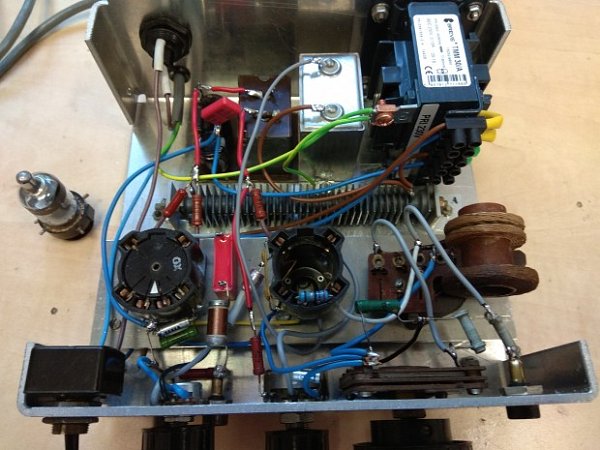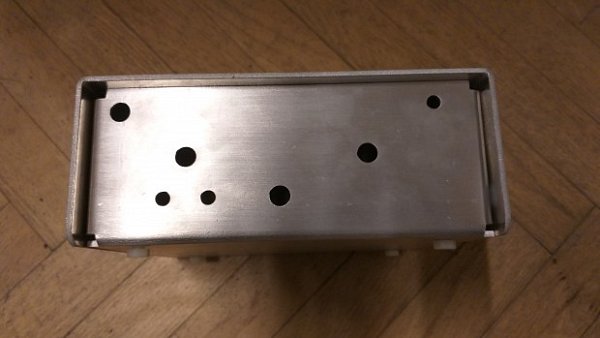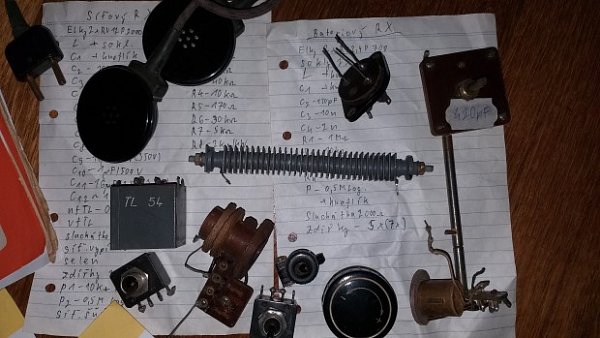Secret Radio of Czechoslovak Political Prisoners
This article is published in memory of Miroslav Kopt, who died today, July 15, 2020, at the age of 85. We are grateful for his valued input, without which this project would not have been possible.
The year was 1957. The device was hidden in the latrine of camp Rovnost near Jáchymov. After destroying it, scout and mukl Miroslav Kopt hurriedly cleaned up its remains. This secret device was a radio on which the Czechoslovak political prisoners listened to Radio Free Europe for two years, receiving and spreading news from the west throughout the prison camp.
The radio was a small miracle. The mukls (political prisoners; the word “mukl” comes from the Czech abbreviation of the phrase “men destined for liquidation”) had built the radio by hand, first in the form of a battery-powered lamp receiver at the Nikolaj forced labor camp, then later as a network receiver at camp Rovnost. Neither radio was ever discovered, since the prisoners destroyed them before the guards could track them down. In the spring of 2020, a faithful copy of the second version of the radio was created and the forgotten story of this link to free information came to life in the form of a school project connecting Bavarian and Czech students.
But let’s start from the beginning. In 2012, issue 77 of the Radiojournal, a magazine published by the Czechoslovak Historical Radio Club, included an article entitled “Tajné radiopřijímače v podmínkách nesvobody,” or “Secret radios in captivity.” The article’s author, Radek Pavlovec, described how he constructed both radios in the Jáchymov camps. Mr. Pavlovec (July 29, 1931 to May 12, 2003) was a mukl and an experienced member of the Scouts, a recreational organization that had been banned under communism. He had created the first device in June 1955 at the instigation of several imprisoned colleagues who were elites from the First Republic, the Czechoslovak state that was created in 1918 and lasted until the German occupation in 1938. In the article, he explained in detail the components he obtained through a circle of reliable colleagues and civilian employees in the Jáchymov mines. In September 1955, he built a second secret radio, this time powered from the network with tubes and exchangeable coils. Pavlovec accompanied his article with a precise diagram, by which a radio receiver could be conceptualized or even constructed. The only problem was finding the original components, which had not been produced for many years.
“It was a classic radio made by Radek Pavlovec, who was in the Jáchymov region for an unsuccessful attempt to escape from the republic. In Nikolaj camp, he met a community of political prisoners who were highly esteemed and grouped the anti-communist mukls around them. This community naturally sought independent information about the situation in Czechoslovakia and abroad. Secret radio was one of the ways to get to them,” explains Miroslav Kopt (85), who we interviewed on the topic of mukl radio in April 2020, in the wake of the coronavirus crisis (see an excerpt from the interview below).
Kopt only actually listened to the radio once, since most of the prisoners who listened were part of a “political club,” and they had very strict rules. However, he also assisted in intelligence activities to move information outside of the camp, even managing to smuggle a picture inside his tooth from one camp doctor to another. In an article by Radio Free Europe/Radio Liberty, Kopt describes some of the intelligence work in the camp: “There was a core group of prisoners who were ready to do anything. They were ready for real political work. Most of all we worked on doing away with the communist regime. This was done in great detail. I was a small part of it all – the radios were made there, foreign stations were listened to, and information about what was going on in the camp reached the outside world. In addition it was possible to listen to the discussions of the secret police and to the records of the wardens of the camps.”
Both radios operated very reliably between 1955 and 1957, so western broadcasting informed a large number of political prisoners in the Jáchymov region. According to Kopt, the first radio was intended for MUDr. Jan Šmíd, a former friend of the Masaryk family, and was operated at the turn of 1956 to 1957 in the infirmary of the Rovnost camp. Today, Kopt is the only living witness of these secret devices and their production. “We chose networks among reliable fellow prisoners and started looking for components. We took the tubes from uranium ore gauges, the tuning was made by ourselves from razor blades, the others were smuggled from mining workshops and from civilians,” recalls the imprisoned scout. “Political prisoners Číla, Syrovátka, Šádek, Blatný, Drahota, Fišer, Stodůlka, and others took part in putting the radios into operation. Within a few months, both radios were ready, and we just had to decide where to operate them. Radek worked in the electrical workshop at the Eduard Mine, in a separate mining house. There, the mukls determined that they would place a box measuring 25 x 20 cm behind an artificial screen, where the prison guards did not have access. The listening was also carried out in the warehouse of mining locksmiths, and in the charger area on the fourth floor of the shaft. Thanks to the discipline of all those named, the whole thing was kept a secret for two years, when I destroyed the device due to suspicions of an allegation and cleared the traces of the whole thing,” adds Kopt, who subsequently underwent a series of interrogations and a six-month investigation. This was not the first time Kopt had been brutally interrogated, having had most of his teeth kicked or pulled out when being kept in Pankrac prison before being moved to Nikolaj camp. Fortunately, Kopt successfully kept the radio a secret, and the details of their operation were never learned by the communist regime.
Radio as a tool of education and reconciliation
The idea of making a copy of the mukl radio was born in the Political Prisoners.eu association, which, among other things, restored the Jáchymov Hell Education Trail and conducts tours for youth and adults at the original sites of uranium mines and camps in the Jáchymov region. The chairman of the association, Tomáš Bouška, obtained the period components and information on how to produce the device with the help of Milan Matějů, the grandson of another imprisoned radio amateur, as well as with the involvement of Miroslav Kopt’s friends. The radio sprung into existence in the spring of 2020, then was tested and tuned by another volunteer, Tomáš Roubíček: “I have been dealing with electronics for a long time, I do it professionally, but this was such a peek into the past and into an area I do not deal with. I’ve never done a tube before, it’s not usually taught anymore, and I’ve never properly built a radio, so it was quite a challenge for me. But I wanted to support a good cause, and in the end, we managed it,” he comments on his key role in the project.
As the radio was being constructed, volunteers from the Political Prisoners.eu association also reached out to discuss cross-border work for reconciliation and understanding with officers from the Weiden Dean’s Office in Upper Palatinate and the parish congregation of the Czech Brethren Evangelical Church in Aš, which works with church youth in border areas. In response to this challenge, Tanja Fichtner and Libuše Kučerová decided to organize an educational project with Czech-German pupils entitled “Za co se stojí nasadit … bezpodmínečně!” or “What is worth deploying … unconditionally!” which took place in October 2019 in Jáchymov, in the Ore Mountains. The school project was funded by the European Union's EÚS Objective and the Czech-German Fund for the Future. By connecting apprenticeships on both sides of the border, young metalworkers from Wiesau and Oselce helped a witness to make a dream come true. That witness was Miroslav Kopt. He met them as part of a guided walk by the Political Prisoners.eu Association on the site of a former communist camp, where he told students how political prisoners secretly set up a radio to listen to the Radio Free Europe broadcast from their homeland of Bavarian Munich. “We have always been well-informed about the global political situation, often better than ordinary people outside the camp,” Miroslav Kopt explains, illustrating the historical context of covert activities in the camps.
He also explained to the students how his prison group had been reported by someone after two years of listening to the radio, and how they had to destroy it quickly so that it would not fall into the hands of the camp guards. Long before this lecture, Kopt had wished to build a replica of the mukl radio, so that he could use it as a commemoration to his time in prison and for educational projects. Thanks to Czech-German metalworkers from both schools, he was finally able to achieve this goal. The result of their collaboration is a faithful copy of the protective box for the radio, made from aluminum sheet. The mukls originally made it from a bakelite casing on the traction battery of a mining locomotive. The headmaster of the German school, Hartmut Seidler, and his fellow teachers Matthias Bartmann, Eva Schicker, Matthias Achatz, Pavel Komárek, and Jiří Wallner, carefully studied the historical diagrams published by the former prisoner and passed into their hands through the volunteer organization. “The project was challenging because the historical materials, especially the technical components needed to run the radio, are no longer available anywhere,” says Hartmut Seidler. “In the end, we agreed with the Czech partners that we would make a cover from aluminum first, because we could do that in one week in a school project.”
Before the radio was built, there was another workshop in October 2019 at the Flossenbürg Concentration Camp. Here, too, they discussed inventive Czech civilians, who, in the last days of World War II, freed many prisoners from the death march from Litoměřice, a branch camp of the Flossenbürg concentration camp. Then, the project became even more topical after the synagogue shooting in Halle. The final presentation in Wiesau began with a minute of silence for the victims, mourning the victims and that history was repeating itself. These events show the need for different groups of people to come together across borders not only in spite of, but because of their differences, such as the Wiesau State Vocational School and the Oselce High School and Elementary School coming together to produce a working replica of the secret mukl radio. It was successfully assembled and tested in May 2020, at the Prague headquarters of the Political Prisoners.eu association. Thanks to its functionality, the volunteers came up with a follow-up project in which they will work with Czech and German scouts, as well as the general public. It will be introduced in early September 2020.
Translated and edited by Charlotte Straley



